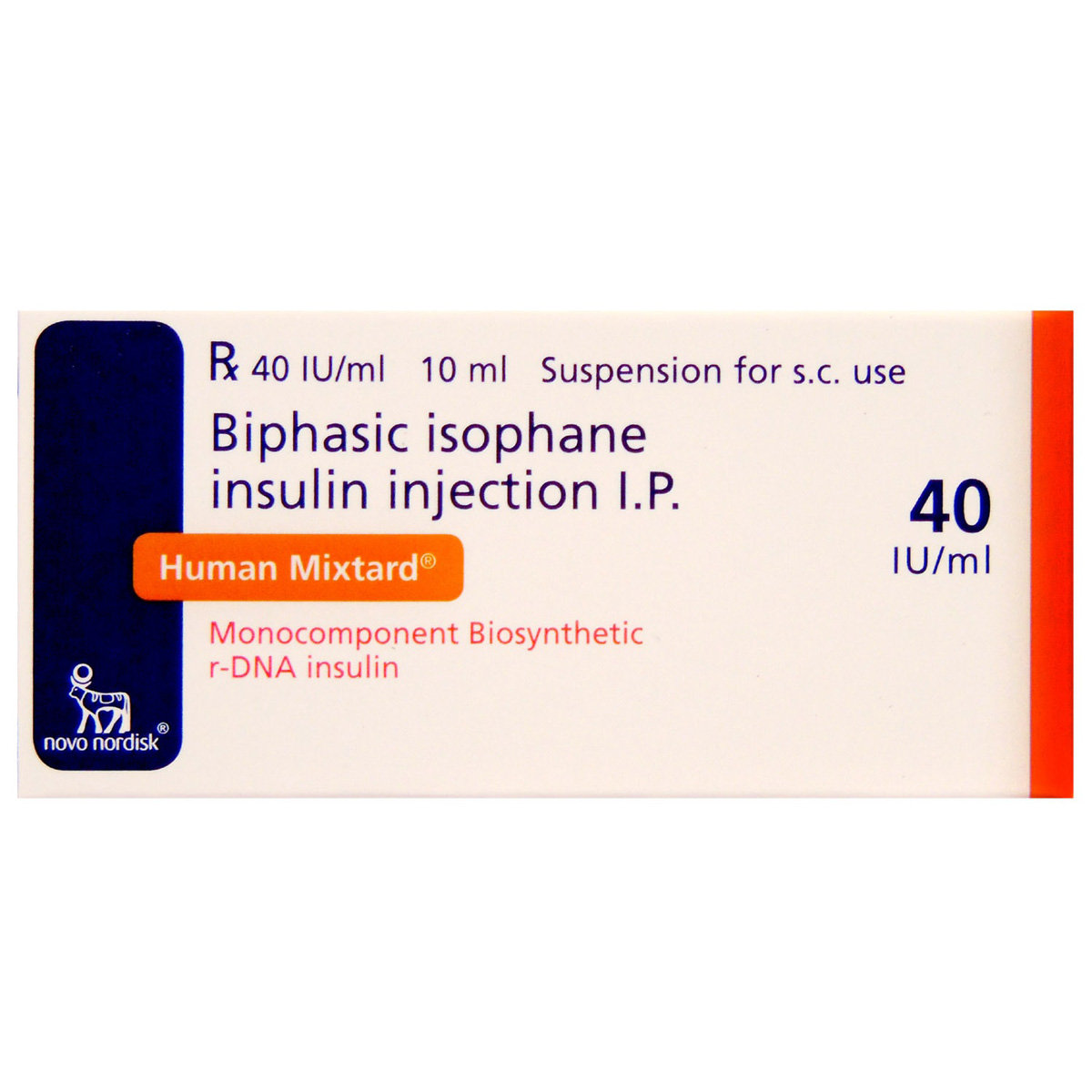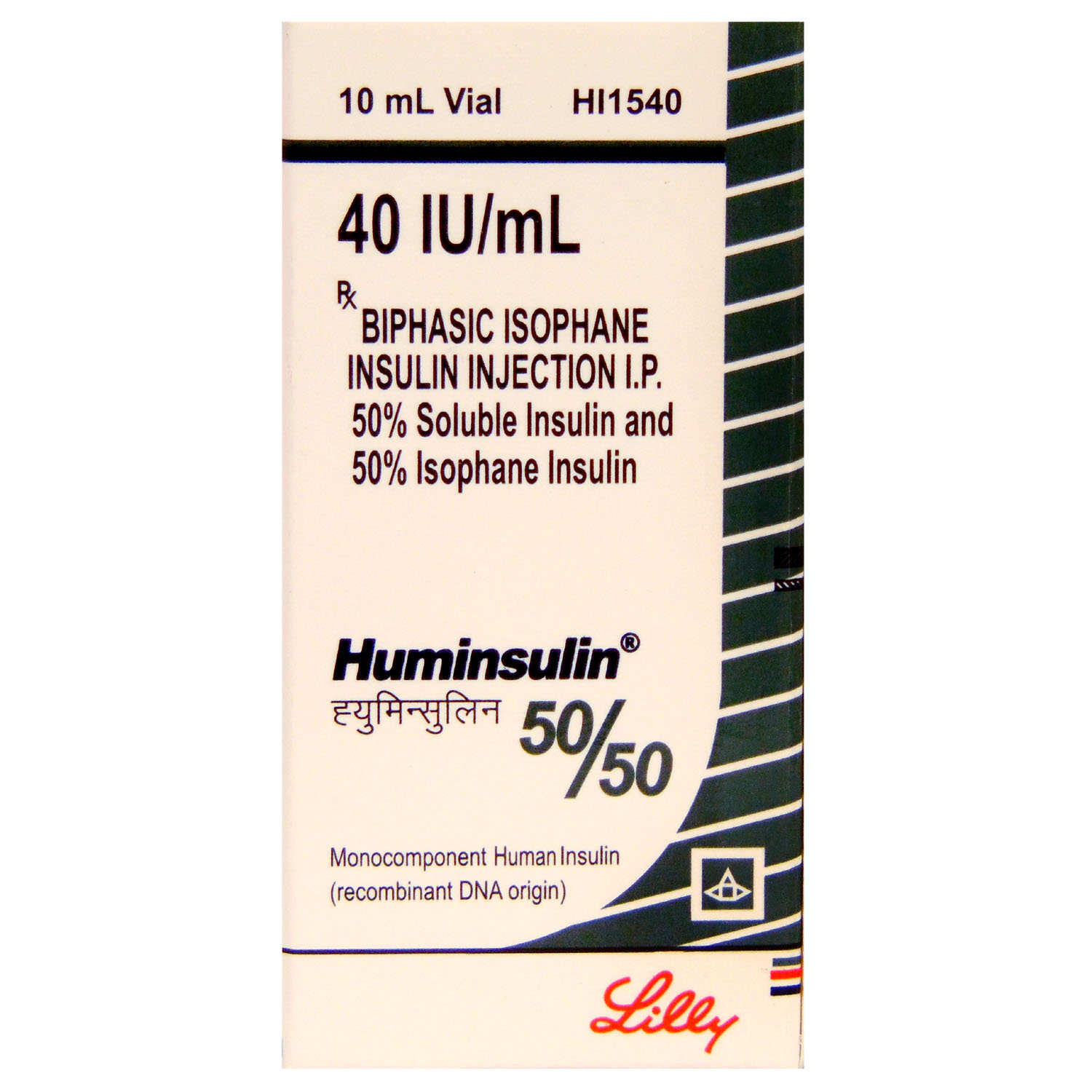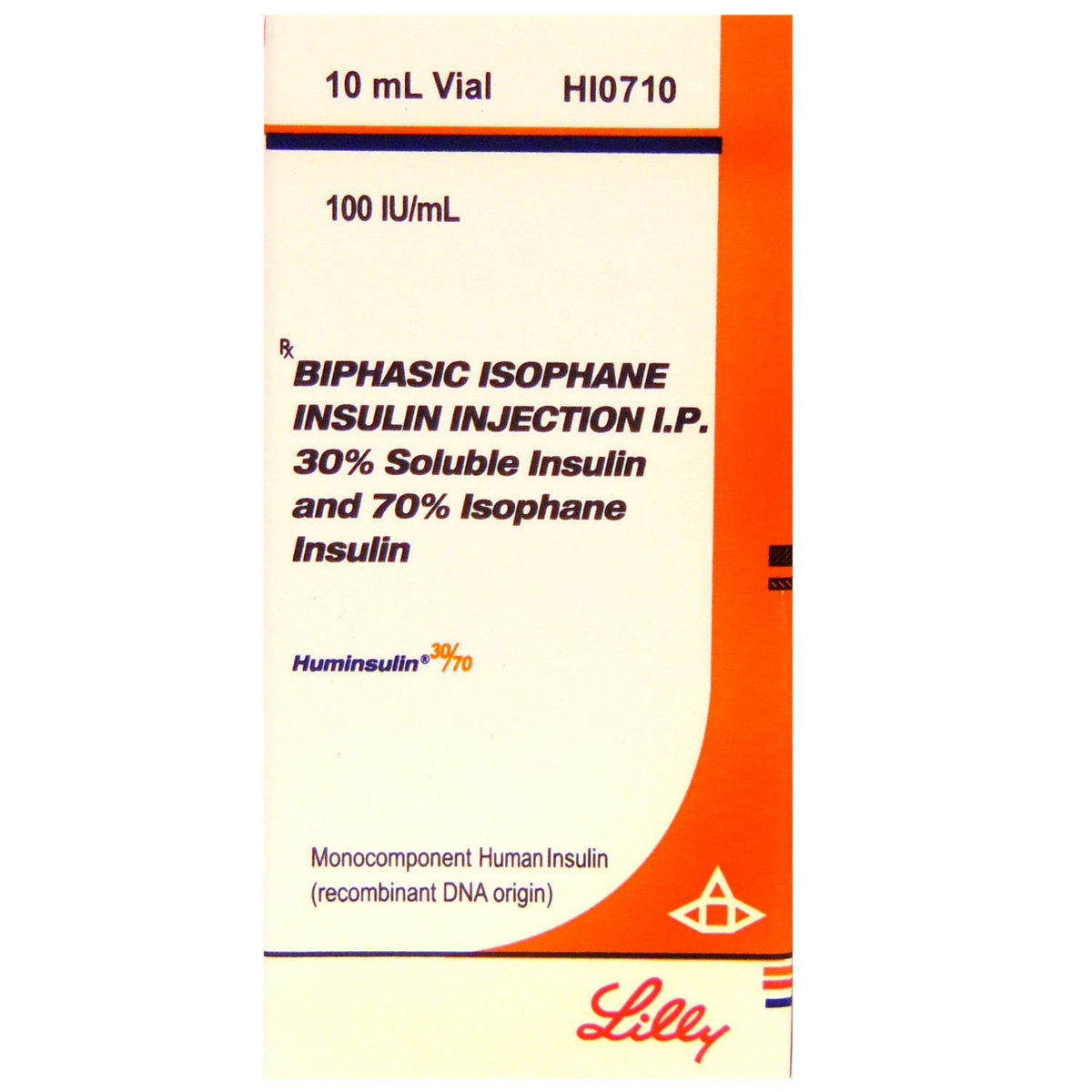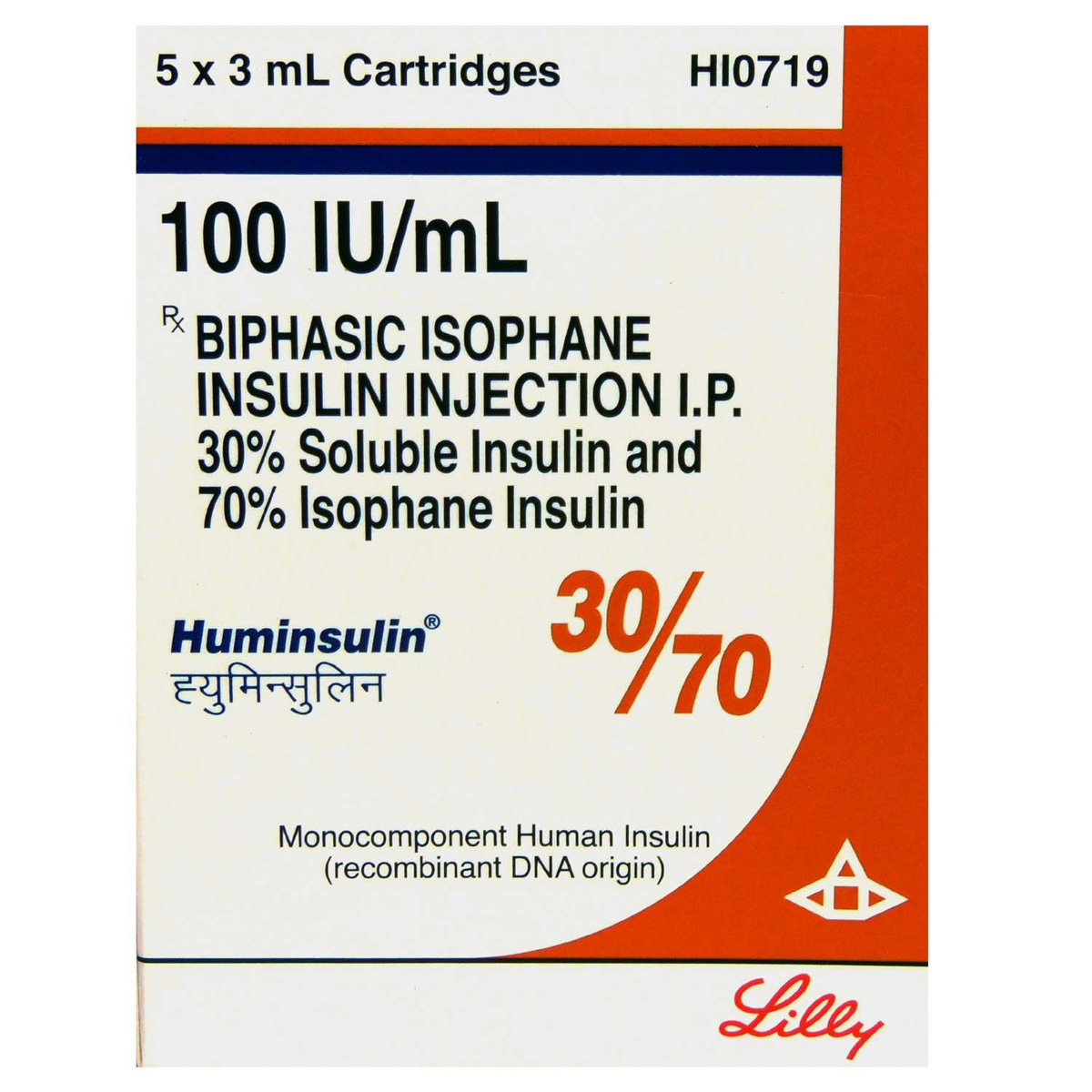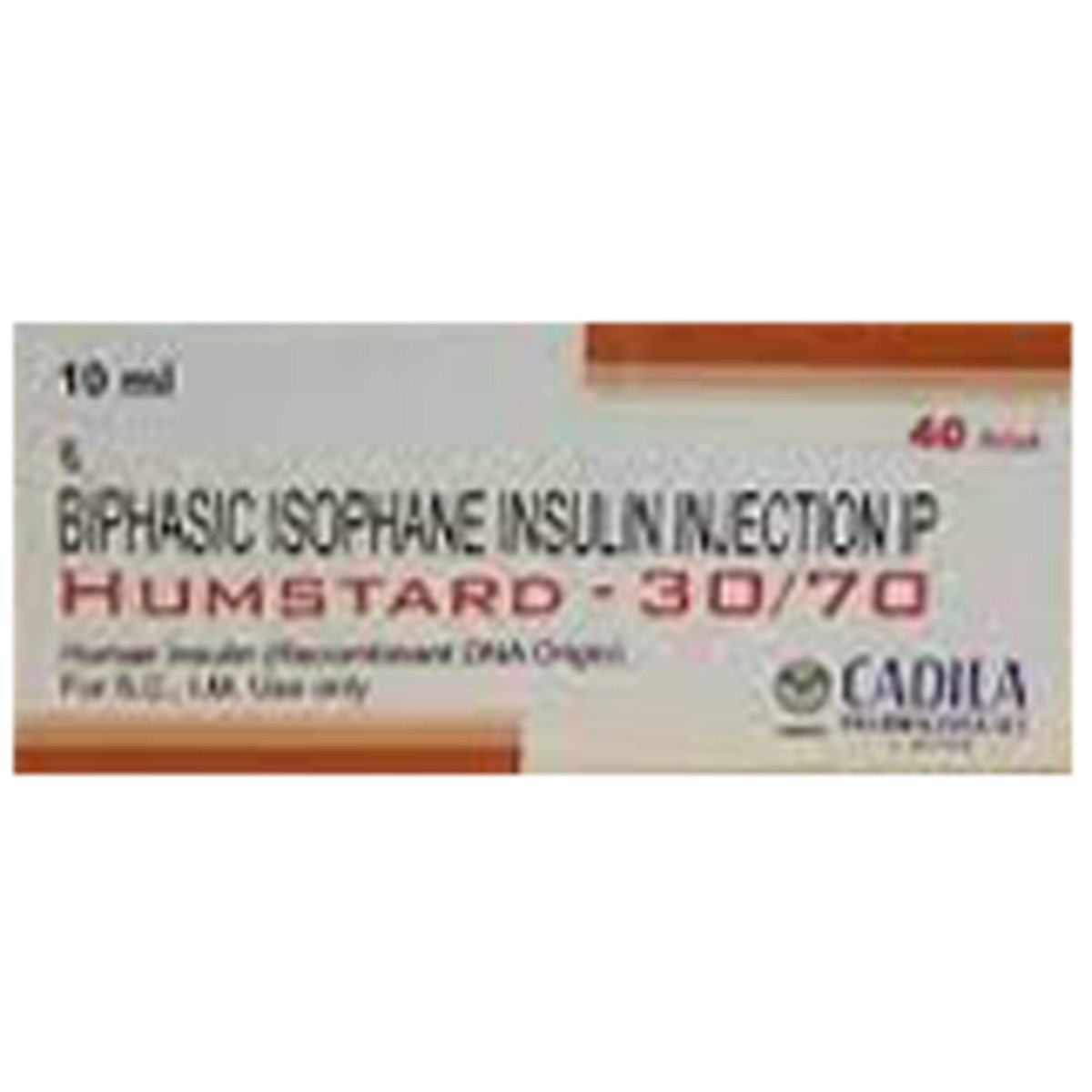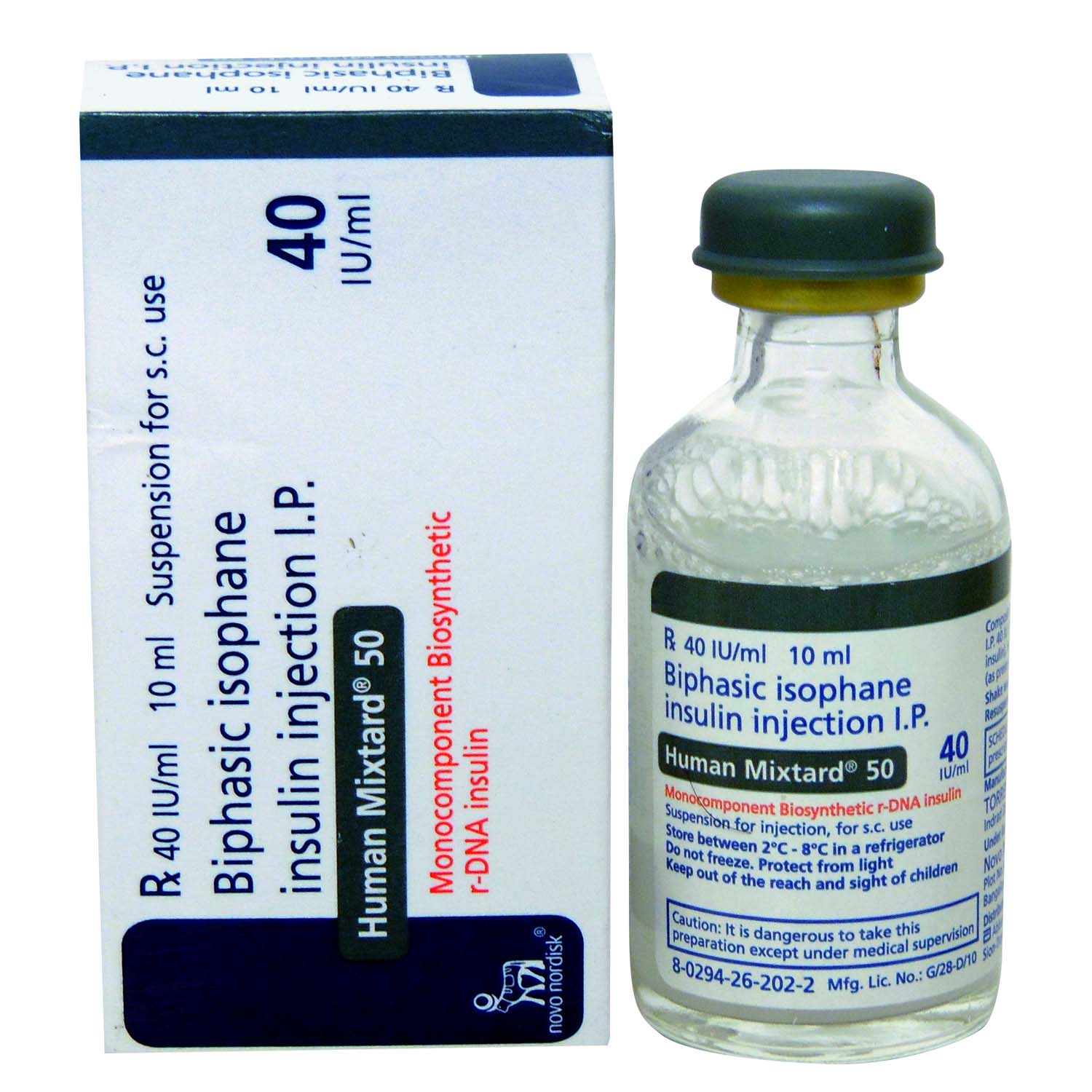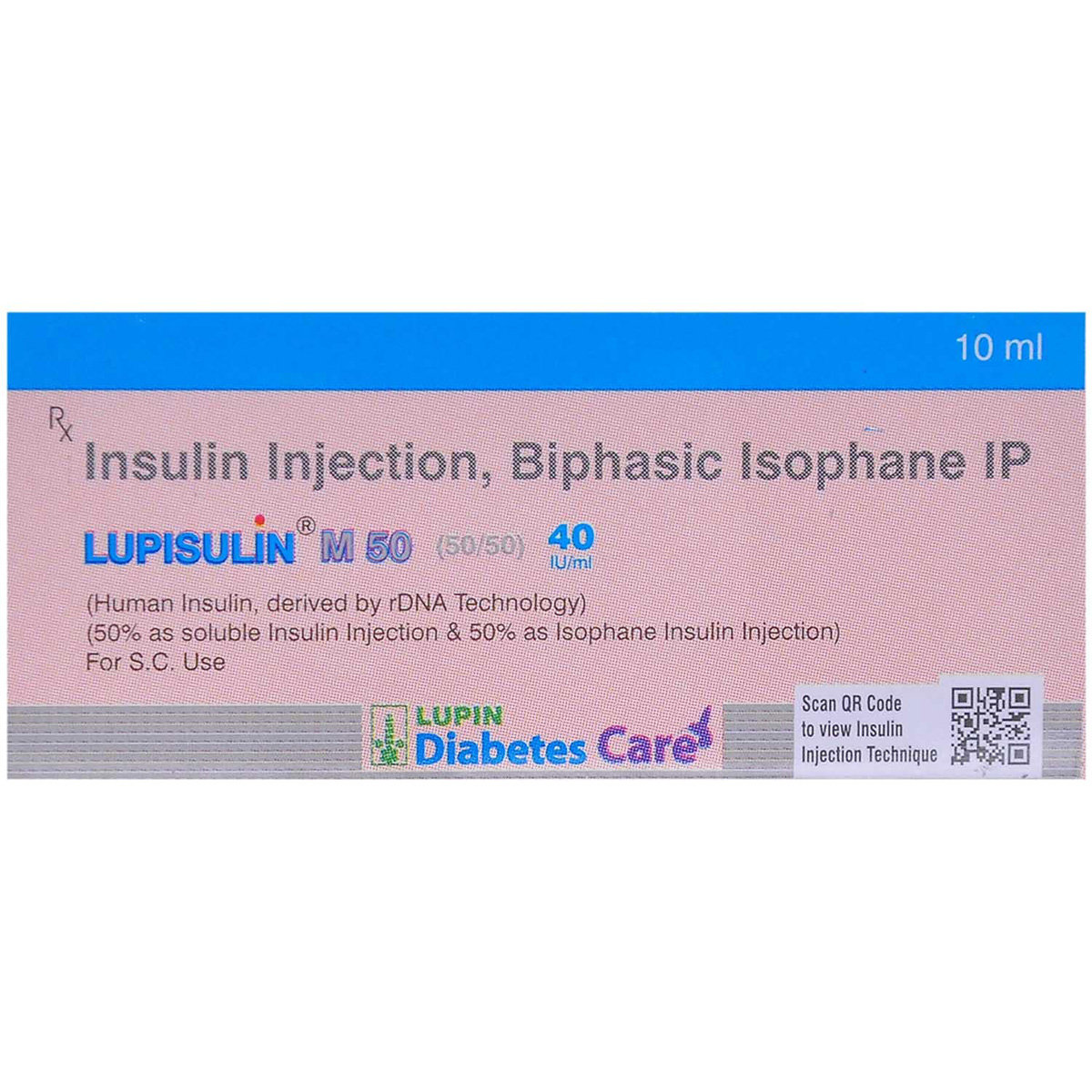Insulin Human+insulin Isophane
About Insulin Human+insulin Isophane
Insulin Human+insulin Isophane is a combination of two medicines, an intermediate-acting and a short-acting type of insulin, primarily used for the treatment of both type 1 and type 2 diabetes mellitus. It maintains blood sugar levels in adults and children. Diabetes mellitus is a condition that affects the way your body processes glucose. In Diabetes Mellitus Type 1, the body does not make enough insulin to control blood sugar levels. In Diabetes Mellitus type 2, either the body stops producing enough insulin (the hormone which helps to decrease sugar levels in the blood) or there is resistance to the action of insulin. As a result, insulin is produced in large amounts but it is not able to act on the organs of the body.
Insulin Human+insulin Isophane is a combination of two drugs one is insulin human (a short-acting type of insulin) and the other is insulin isophane (intermediate-acting). Insulin human is a hormone known as 'insulin' made in your pancreas, which helps your body utilize glucose (sugar) for energy. Insulin Isophane contains human insulin, used to improve blood sugar control in adults and children with type 1 and type 2 diabetes mellitus. It maintains blood sugar levels in both adults and children. Insulin Human+insulin Isophane helps to lower the blood sugar (glucose) level by facilitating the uptake of glucose. It is followed by the binding of insulin to the cells of muscle and fat cells thereby inhibiting glucose release from the liver. Thus, together Insulin Human+insulin Isophane helps to decrease blood glucose levels after the intake of meals. Besides this, it also prevents the chances of developing serious complications of diabetes like damage of retina (retinopathy), damage of kidney (nephropathy), damage of nerve cells (neuropathy), diabetic foot ulcer, and others.
Take Insulin Human+insulin Isophane as prescribed by your doctor. You are advised to take Insulin Human+insulin Isophane for as long as your doctor has prescribed it for you depending on your medical conditions. You may experience an allergic reaction at the site of injection, hypoglycemia (low blood glucose level), itching, lipodystrophy (skin thickening or pits at the injection site), edema (swelling), rashes, and weight gain. Most of these side effects of Insulin Human+insulin Isophane do not require medical attention and gradually resolve over time. However, if the side effects are persistent, reach out to your doctor.
In type 1 diabetes, untreated high blood sugar levels can lead to a life-threatening condition known as diabetic ketoacidosis. Try not to stop taking this medicine of your own. Let your doctor know about this, as it may cause withdrawal symptoms. Do not take this medicine if you have any low blood glucose levels, kidney, liver, or heart problems, or problems with alcohol or other prescription recreational drugs. Along with this medicine, you should take a healthy diet, do regular exercise, and maintain weight as advised by your doctor. Insulin Human+insulin Isophane is a cold chain medicine and so it has to be stored in the refrigerator between 2-8 degrees Celsius else its efficiency may be lost. Do not store in the freezer of the refrigerator.
Uses of Insulin Human+insulin Isophane
Medicinal Benefits
When you take Insulin Human+insulin Isophane, it works by ensuring rapid and consistent sugar control. It facilitates the reuptake of sugar in muscle and fat cells and also suppresses the production of sugar in the liver. It prevents the chances of developing serious complications of diabetes. Besides this, Insulin Human+insulin Isophane can be safely prescribed to the diabetic mother in the pregnancy as well as the lactation stage. Insulin Human+insulin Isophane helps in improving glycaemic control which in turn decreases the risk of progression of complications of diabetes like damage to the retina (retinopathy), damage of kidney (nephropathy), damage of nerve cells (neuropathy), delayed wound healing, diabetic foot ulcer, and others.
Directions for Use
Storage
Side Effects of Insulin Human+insulin Isophane
- Allergic reaction at the site of injection
- Hypoglycemia (low blood glucose level)
- Itching
- Lipodystrophy (skin thickening or pits at the injection site)
- Edema (swelling)
- Rashes
- Weight gain
Drug Warnings
Insulin Human+insulin Isophane is for subcutaneous use only and should never be administered intravenously (IV) or in the veins. If you are changing the brand of insulin, it should be done under strict medical supervision. Cases of heart failure have been reported when pioglitazone was used with insulin especially in patients who are at high risk of cardiac heart failure. The first symptoms of hyperglycemia (high blood sugar level) may include symptoms like excessive thirst, dry mouth, increased frequency of urination, nausea, vomiting, drowsiness, flushed dry skin, loss of appetite, and acetone odor of the breath. You should closely monitor these symptoms. Symptoms like heart failure, weight gain, and edema (fluid deposition in tissue) should not be overruled. You are recommended not to consume alcohol as it may elevate blood glucose levels. Care should be taken when you are traveling across more than 2 time zones. Your doctor may adjust your insulin schedule. Insulin Human+insulin Isophane may decrease the level of potassium leading to a state of hypokalaemia that, if left untreated, may lead to respiratory paralysis, irregular heartbeat rhythm, coma, and even death. Do not take this medicine if you have any low blood glucose levels, kidney, liver, or heart problems, or problems with alcohol or other prescription recreational drugs.
Drug Interactions
Drug-Drug Interaction: This medicine may have an interaction with anti-depressants (phenelzine, iproniazid, isocarboxazid, nialamide, imipramine, desipramine, tranylcypromine, moclobemide), anti-Parkinson’s drug (selegiline), antibiotic (linezolid), (lithium, tryptophan), migraines drug (sumatriptan), pain killer (tramadol), anti-ulcer (cimetidine, lansoprazole, omeprazole), anti-fungal (fluconazole), anti-stroke pills (ticlopidine), blood-thinners (warfarin, dipyridamole, and phenprocoumon), antimalarial (mefloquine), heart-related drug (flecainide, propafenone), and medicines that decrease blood levels of potassium or magnesium, as these increase the risk of life-threatening heart rhythm disorder. Besides this, the use of oral antidiabetic pills like pramlintide acetate and antibiotics (pentamidine) may cause hypoglycemia (low blood sugar level).
Drug-Food Interaction: Insulin Human+insulin Isophane may interact with an ayurvedic, homeopathy, Unani, herbal supplements, or OTC items. Tell your doctor if you are using these products. Try to avoid intake of alcoholic beverages with Insulin Human+insulin Isophane as it may lower blood sugar level (hypoglycemia).
Drug-Disease Interaction: Insulin Human+insulin Isophane should not be given to patients with kidney disease, liver disease, low potassium level (hypokalaemia), and low blood sugar/glucose level (hypoglycemia).
Drug-Drug Interactions Checker List:
Safety Advice

Alcohol
unsafeYou are recommended not to consume alcohol along with Insulin Human+insulin Isophane to avoid unpleasant side-effects. Alcohol may intensify and prolong the hypoglycemic effect of insulin.

Pregnancy
safe if prescribedPlease inform your doctor if you are pregnant as a dose adjustment may be required. The amount of insulin you need usually falls during the first three months of pregnancy and increases for the remaining six months

Breast Feeding
safe if prescribedPlease inform your doctor if you are breastfeeding as a dose adjustment may be required. You may be advised to alter your insulin intake or to modify your diet.

Driving
cautionDrive with caution, Insulin Human+insulin Isophane usually causes drowsiness and affects driving ability. Your ability to concentrate and react may be reduced if you have hypoglycemia (low blood sugar).

Liver
cautionInsulin Human+insulin Isophane to be taken with caution, especially if you have a history of liver diseases/conditions. The dose may have to be adjusted by your doctor.

Kidney
cautionInsulin Human+insulin Isophane to be taken with caution, especially if you have a history of kidney diseases/conditions. The dose may have to be adjusted by your doctor.

Children
safe if prescribedInsulin Human+insulin Isophane can be given safely to children provided the dose has been prescribed by a child specialist.
Habit Forming
Diet & Lifestyle Advise
- Exercise may lower your body’s need for insulin during and for some time after the physical activity.
- Exercise may also speed up the effect of an insulin dose, especially if the exercise involves the area of the injection site (for example, the leg should not be used for injection just prior to running).
- Avoid eating sugar food and prefer food cooked food low in calories.
- While traveling across more than 2 time zones, you should talk to your doctor concerning adjustments in your insulin schedule.
Special Advise
If you feel any symptoms of Hypoglycemia (fatigue, dizziness ,Confusion, heart palpitations, shakiness and anxiety), consult your doctor immediately.
Patients Concern
Disease/Condition Glossary
In type 1 diabetes mellitus our body does not make insulin (the hormone which helps to decrease sugar levels in the blood) to control blood sugar levels.
In type 2 diabetes mellitus, either the body stops producing enough insulin or there is resistance to the action of insulin. As a result, insulin is produced in sufficient amounts but is unable to act on the tissues of the organs.
FAQs
Insulin kept out of the refrigerator will not poison you or even make you sick. It just means that your Insulin Human+insulin Isophane will not work as well or deliver its full potential dose. In simple terms, if your blood sugar is high, and you use the insulin that has been kept out, your blood sugar may not be lowered. In short efficacy of Insulin Human+insulin Isophane will be decreased if not kept in the refrigerator between 2-8 degrees Celsius.
If Insulin Human+insulin Isophane is taken in more than the recommended doses, it can cause mild to severe hypoglycemic episodes.
Symptoms of high blood sugar include increased thirst, frequent urination, fatigue, vomiting, shortness of breath, nausea, stomach pain, dry mouth, fruity breath odor, and a fast heartbeat.
Insulin Human+insulin Isophane is to be injected subcutaneously (under the skin). The best areas to give Insulin Human+insulin Isophane are your upper thigh, stomach, upper arm, or buttocks.


